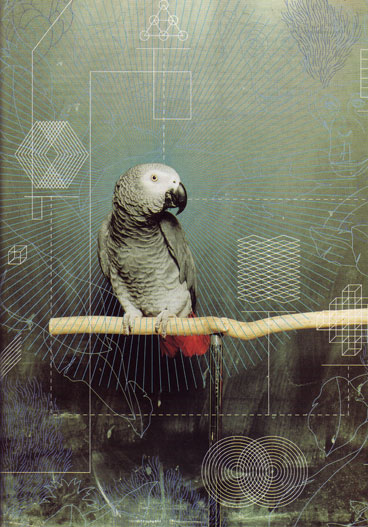tags: Alex, African grey parrot, Psittacus erithacus, cognition, learning, speech disabilities, Irene Pepperberg
Alex, the African grey parrot, Psittacus erithacus,
who worked with Irene Pepperberg for more than 30 years.
Image: Illustration by Andrew Kuo, Photograph by John Woo.
An article about Alex, the African grey parrot who worked with Irene Pepperberg, has been reprinted on the Seed magazine site. This piece was originally published in 2004 and reappears now as a memorial to Alex. It includes lovely images, such as the one above.
Alex is an African Grey parrot, but in all likelihood, he wasn't born in Africa. Like most birds in pet shops, he was probably bred as a "domestic" in North America, but that's all we know about Alex's early history. We don't know who his parents are or his exact birth date. Some of this mystery was appealing to Pepperberg in her search for the perfect specimen to test her theories about avian intelligence. She didn't want anyone thinking she'd picked a "super" bird that had been bred especially for smarts. In Pepperberg's hands, Alex (whose name stands for Avian Learning EXperiment) was going to show the world that parrots can do more than, well, parrot. Namely, they can mean what they say. If Polly wants a cracker, she really wants a cracker. Or, as Pepperberg explains it, birds can think. And not in the way you've seen your dog thinking when you catch him staring at the exact spot on the kitchen floor where you dropped a pot roast six months ago. According to Pepperberg, Alex has the cognitive abilities of a 6-year-old child. He can identify objects, colors, and shapes, and he's not just repeating what he hears. This is a substantial claim, given that Alex's brain is the size of a shelled walnut. [story].
Unfortunately, just like the LATimes piece, Seed also got the lifespan of this species wrong. "Congo" African grey parrots live approximately 50-60 years in captivity, okay? They do not live to be 90-100 years old. That's just an outlandish claim.


I am glad to see a rebuttal here of the "big-brain" chauvanism that gives rise to disparaging stereotypes such as "bird brain." I was reading recently that the neuron packing in the brain of the European honeybee is much more efficient than in larger-brained animals, and the ability of this insect to navigate its way around is a clear manifestation of how well the miniscule bee brain works with about 100,000 or so neurons.